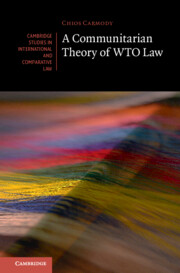Book contents
- A Communitarian Theory of WTO Law
- Cambridge Studies in International and Comparative Law: 181
- A Communitarian Theory of WTO Law
- Copyright page
- Dedication
- Epigraph
- Contents
- Figures
- Preface
- Acknowledgments
- 1 A Theory of WTO Law
- 2 The WTO Agreement as Community
- 3 The WTO Agreement and Justice
- 4 The WTO Agreement as a Law of Obligations
- 5 The WTO Agreement as a Law of Rights
- 6 The WTO Agreement as a Sui Generis Legal System
- 7 A Communitarian Theory and International Investment Law
- 8 Some Concluding Thoughts
- Bibliography
- Index
- Cambridge Studies in International and Comparative Law
6 - The WTO Agreement as a Sui Generis Legal System
Published online by Cambridge University Press: 14 December 2023
- A Communitarian Theory of WTO Law
- Cambridge Studies in International and Comparative Law: 181
- A Communitarian Theory of WTO Law
- Copyright page
- Dedication
- Epigraph
- Contents
- Figures
- Preface
- Acknowledgments
- 1 A Theory of WTO Law
- 2 The WTO Agreement as Community
- 3 The WTO Agreement and Justice
- 4 The WTO Agreement as a Law of Obligations
- 5 The WTO Agreement as a Law of Rights
- 6 The WTO Agreement as a Sui Generis Legal System
- 7 A Communitarian Theory and International Investment Law
- 8 Some Concluding Thoughts
- Bibliography
- Index
- Cambridge Studies in International and Comparative Law
Summary
Time is an active element in a communitarian theory of WTO law. Across the passage of time, the idea-complexes of obligations and rights identified in previous chapters interact, bringing about law in a third overarching idea-complex. This chapter examines how this third idea-complex takes the form of a sui generis legal system generating transformative justice. Here the law focuses on the present and is reasoned abductively according to the best inference consistent with current knowledge. Notwithstanding this reconciliation, the transformations required and induced by it are profound. They demand that actors pay attention to interests other than their own. They also demand that actors conceive of and conform their behavior in light of that transformed interest. In WTO law this interest co-exists uneasily with the sovereignty of states so that there is a persistent tension between individual member interests and the collective interest of the membership. Outcomes of WTO disputes often manifest this basic tension.
Keywords
- Type
- Chapter
- Information
- A Communitarian Theory of WTO Law , pp. 326 - 369Publisher: Cambridge University PressPrint publication year: 2023

